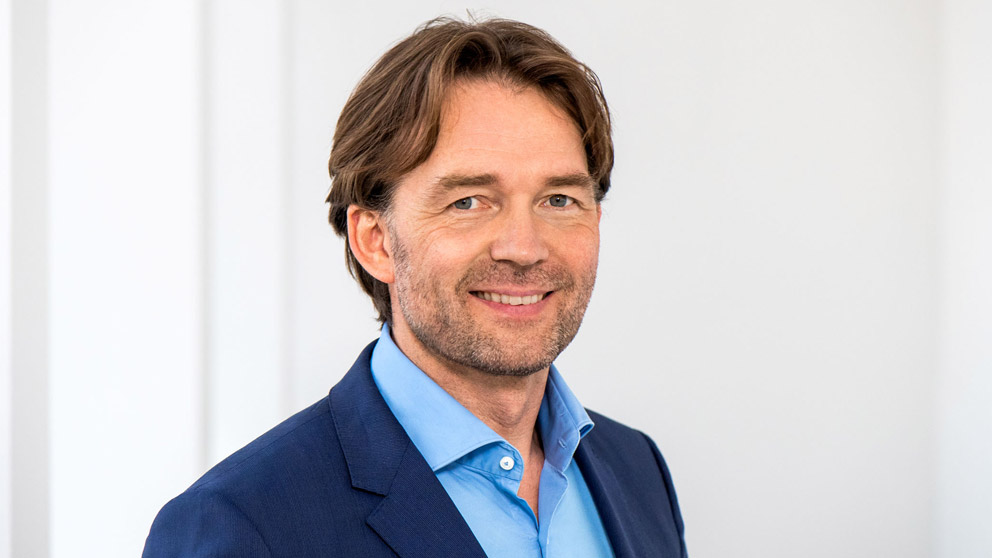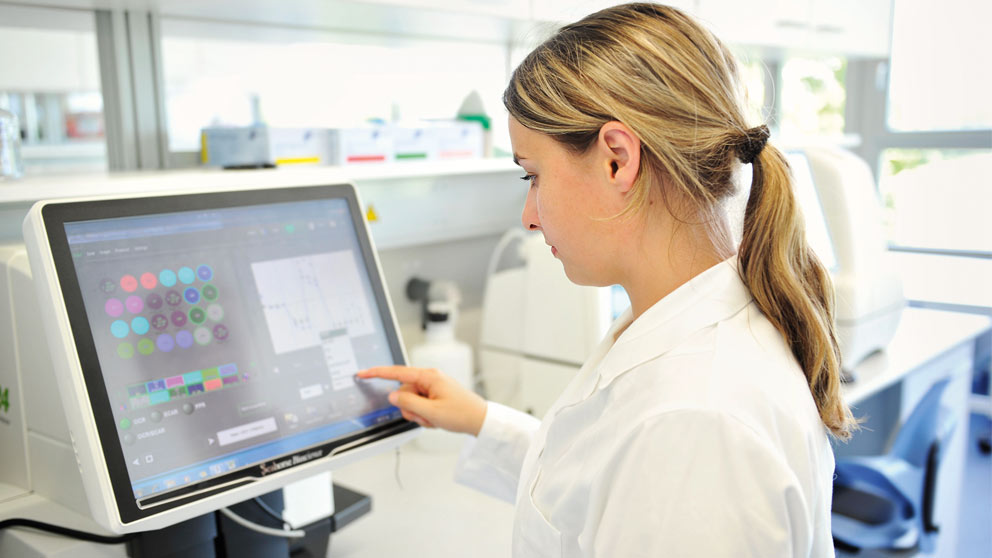Jump to the content
- {{#headlines}}
- {{title}} {{/headlines}}

Professor Dr Matthias Tschöp is a world authority on diabetes research. The medical researcher spent ten years working in the United States, finally holding the Arthur Russell Morgan Chair of Medicine at the University of Cincinnati, Ohio. In 2012, he was awarded an Alexander von Humboldt Professorship and is now back in Germany heading the Institute for Diabetes and Obesity at the German Research Centre for Environmental Health, Helmholtz Zentrum München, and holding the Chair of the Department of Metabolic Diseases at the Technical University of Munich.

Time is short for one man’s big mission: Matthias Tschöp wants to heal pathological obesity and diabetes – with a simple pill or injection. The Munich medical researcher is one of the world’s most sought-after specialists in this field, his working day packed with lectures, expert committees and team meetings. Tschöp’s goal is ambitious given that the two diseases he has specialised in, obesity and diabetes, are turning into an ever-greater challenge to world health. “Nearly every tenth German has diabetes or will have,” he says. In Germany alone, 6.7 million people suffer from diabetes and 300,000 new cases are registered every year. The biggest risk factors include excess weight, lack of movement and stress.
So exactly what role does weight play in the development of diabetes? Is it enough just to eat less and move more? Can our behaviour change anything? Or is the answer to be found in our genes, in our brain? These are the questions Tschöp looks to answer, combining fundamental research with the search for drugs, because the 50-year-old does not merely want to understand the mechanisms behind obesity and diabetes but to develop drugs to heal them as well.
And who better than Tschöp, a man who has experienced many different perspectives? His own professional biography started in Munich where he was a male nurse and mountain rescue emergency doctor. Having worked in multiple hospitals, at distinguished research institutes and for pharmaceutical companies around the world, many career stages later saw him back in Munich as the holder of an Alexander von Humboldt Professorship. Awarded in 2012, it was the first time the honour had been granted to a physician. Tschöp heads the Institute for Diabetes and Obesity at the German Research Centre for Environmental Health, Helmholtz Zentrum München, and holds the Chair of the Department of Metabolic Diseases at the Technical University of Munich – which does not leave him much scope for hands-on lab work. “Of course, nowadays, I’m not the one standing in the lab testing the active ingredients and pipetting the substances,” he says. But Tschöp has lost nothing of his passion for the researcher’s life with its routine toil and euphoric moments. Perhaps one of the secrets of his success: “It’s bringing together different individual perspectives in a team that helps us to solve problems.”
Numerous awards and honours
More than 300 entries grace his scientific publication list, he has received numerous awards and honours for his work, he holds lectures and appears on television. There is little evidence of any glamour in his study at Garching Business Park, near Munich. Monitors, simple furni ture, white walls. A view through the window of the green heathland to the north of Munich. No plants, no clutter to distract one or demand attention – nothing to gather dust.

At Helmholtz Zentrum München, Tschöp is surrounded by a team of experts from the most diverse disciplines: physicians, cancer and brain researchers, geneticists and cell biologists – they are all searching for the causes of excess weight, obesity and diabetes because when people’s weight and blood sugar levels go haywire, there are many contributory factors. Sadly, the solution is not usually a simple case of eating less and moving more, especially as not everyone with love handles gets diabetes and not every diabetic is overweight. And whilst some people only have to look at a piece of cake to put on weight, others can indulge without gaining a gram.
The role of hormones
This, of course, has a lot to do with our DNA. There is a certain gene, for example, that is responsible for producing the hormone leptin, which is secreted by fat cells and inhibits the appetite. Some people, however, do not have the leptin gene. “Patients like that don’t stand a chance,” says Tschöp. “The strongest will in the world won’t help them eat less.” Monogenetic causes like this are, however, relatively unusual; they tend to be polygenetic. “We carry a number of gene mutations around with us. Individually, they are not such a problem, but if they come together and are combined with environmental factors they can lead to diseases like diabetes.”
Researchers are also devoting ever more attention to the role of epigenetics. Environmental factors, movement, nutrition and stress influence which parts of the genetic information coded in our DNA are read in building proteins and which are not. They thus determine which chemical messengers, enzymes and hormones circulate around our bodies. These mechanisms can even be inherited because an immoderate lifestyle and the diseases it engenders alter our DNA – and can be passed on to our children epigenetically.
Tschöp and his team are particularly interested in the signal paths between the brain and our metabolic organs since the brain constantly absorbs information, nutrients and hormones from the stomach, intestines and liver via the sugar and fat content in the blood, for instance, or via the amount of insulin secreted by the pancreas. It can respond to all these cues and send signals to the organs, such as the ones controlling our appetite.

Scientists have now identified many of the hormones that communicate with the brain and other organs and regulate the sugar and fat metabolism. Tschöp and his team, for example, elucidated the function of the hunger hormone ghrelin. Our bodies produce this molecule in the stomach lining and pancreas and it is activated by our diet. It functions like a kind of fat sensor. Ghrelin informs the brain about the number of calories on offer and gives the signal for launching energy-consuming processes such as the creation of new proteins and growth mechanisms.
A host of other hormone molecules also originate in the gastrointestinal tract. “Unfortunately, we don’t yet know which of these molecules are the decisive ones,” says Tschöp, “otherwise we could trick the brain into thinking it had eaten enough.” And start losing excess weight. Surgeons already achieve much the same with a gastric bypass. Shortly after the operation, the patient’s blood sugar level returns to normal. Triggered by the surgery, the gastrointestinal tract apparently sends certain chemical messengers to the brain signalling satiation.
Setting the brain to “full”
Tschöp and his team want to find a less invasive way of outsmarting the brain, such as an anti-obesity drug, and they have already taken one crucial step on the way to developing such a substance. “We managed to integrate several of these gastrointestinal hormones into a single molecule.” This hormone molecule acts as a kind of master key to several docking stations in various organs as well as the brain. It can re-set the processes governing appetite. According to Tschöp, it basically works like a contraceptive pill, which makes the female body believe it is pregnant. The slimming pill sets the brain to “full” even if there is not much in the gastrointestinal tract. Experiments with mice have shown that it works: they ate much less even though the researchers put them on a McDonald’s diet. “We are now doing clinical studies on these substances and hope we’ll soon know how well they function in humans,” says Tschöp.
Meanwhile, he is already thinking about the next stage: not everyone is the same and every diabetic has quite different health issues. “So, our vision is to find the right drug for the right patient, a kind of personalised metabolism medicine,” he explains.
After all, Tschöp never loses sight of his mission: “Diabetes and obesity are two of the big widespread diseases and a threat to our society,” he says. “We mustn’t lose any time in developing effective, safe therapies and new drugs tailored to the individual patient.”
